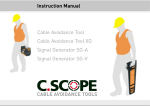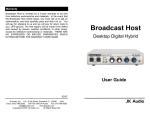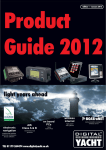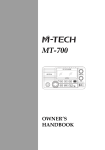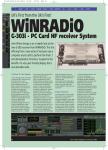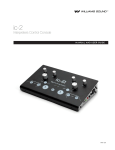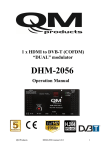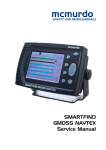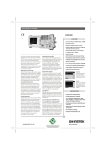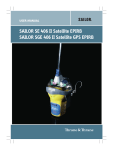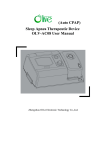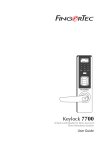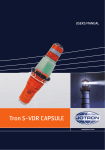Download SR203™ // GMDSS Multichannel Portable VHF Survival Radio
Transcript
PRODUCT SUPPORT MANUAL SR203™ // GMDSS Multichannel Survival Radio Model No.: SR203 Product Nos.: 2827, 2828 and 2829 Y1-03-0253 Rev. C Portable VHF The Technical Data, information and illustrations contained in this manual were believed to be correct at the time of print. ACR Electronics, Inc. reserve the right to change specifications and other information contained in this manual as part of our continual improvement process. No part of this manual may be reproduced, stored in a retrieval system or transmitted in any form, electronic or otherwise, without prior permission of ACR Electronics, Inc. No liability can be accepted for any inaccuracies or omissions in this manual. About ACR Electronics, Inc. ACR Electronics, Inc., www.acrartex.com, designs and manufactures a complete line of safety and survival products including EPIRBs, PLBs, AIS, SARTs, Strobe Lights, Life Jacket Lights, Search Lights and safety accessories. The quality systems of this facility have been registered by UL to the ISO 9001:2008 Series Standards. Recognized as the world leader in safety and survival technologies, ACR has provided safety equipment to the aviation and marine industries as well as to the military since 1956. CAUTION: Before proceeding to install, test or use your new ACR Electronics’ product, please read this Product Support Manual in its entirety. If you have questions regarding the contents of the manual, please contact our Technical Service Department at ACR Electronics, Inc., Telephone +1 (954) 9813333. Please be ready to provide the technician with the page number you wish to discuss. If you have a question that is not covered in the manual, please visit our website and access the Frequently Asked Questions (FAQs) section for further information or call our Technical Service Department. The website address is www.acrartex.com. If in the future you lose this manual, you may access and print a replacement on the ACR website. 2 Y1-03-0253 Rev. C Basic Operation In emergency ensure the yellow Lithium primary battery is fitted. Before operation break off the red security tag from the battery. Turn on by pressing the The radio will turn on with the distress and calling channel 16 already selected Use the ▲ and ▼ keys to select the required channel Use the VOL key followed by the ▲ and ▼ keys to adjust the speaker volume Use the SQ key followed by the ▲ and ▼ keys to adjust the squelch (muting) level Use the PTT key to transmit key To transmit a MAYDAY call the following procedure should be followed. Ensure the radio is turned on, channel 16 is selected and the PTT key is pressed. Announce the following clearly into the radio MAYDAY - MAYDAY - MAYDAY This is [Ship’s Name] - This is [Ship’s Name] - This is [Ship’s Name] MAYDAY [Ship’s Name or Call Sign] Position………… [LAT and LON or description] Nature of Distress is ……….. [State the aid required] The Number of Persons on board is… [followed by any useful information] Over 3 Y1-03-0253 Rev C Contents 1. General ......................................................................................................... 5 1.1. Exposure to RF Electromagnetic Energy .............................................................. 5 1.2. Warnings ................................................................................................... 5 1.3. Installation ............................................................................................... 5 2. SR203 Overview ............................................................................................. 6 3. Operation ...................................................................................................... 7 4. 3.1. Switching On .............................................................................................. 7 3.2. Switching Off .............................................................................................. 7 3.3. Channel Selection ......................................................................................... 7 3.4. Channel 16 selection ..................................................................................... 7 3.5. Transmitting ............................................................................................... 7 3.6. Volume Adjustment ...................................................................................... 7 3.7. Squelch Adjustment ...................................................................................... 7 3.8. Lights Adjustment ........................................................................................ 8 3.9. Dual Watch ................................................................................................ 8 3.10. Tri-Watch ............................................................................................... 8 3.11. Scan ..................................................................................................... 8 3.12. Memory Scan ........................................................................................... 9 3.13. Scan advance .......................................................................................... 9 3.14. Setting Scan Channels ................................................................................ 9 3.15. Hi/Lo ..................................................................................................... 9 3.16. Key Lock ................................................................................................ 9 Menu ............................................................................................................ 9 4.1. 5. 6. Individual Menu Modes ............................................................................ 10 Batteries ..................................................................................................... 12 5.1. Battery Fitting and Removal .......................................................................... 12 5.2. Warnings ................................................................................................. 12 5.3. Charging ................................................................................................. 13 Appendix ..................................................................................................... 14 6.1. Maintenance and Troubleshooting ................................................................... 14 6.2. Transportation / Shipping ............................................................................. 14 6.3. Specifications ............................................................................................ 15 6.4. Channels ................................................................................................. 16 6.5. Accessories .............................................................................................. 17 6.6. Approvals ................................................................................................ 17 6.7. Limited Warranty ....................................................................................... 18 6.8. Notices ................................................................................................... 18 4 Y1-03-0253 Rev C 1. General The SR203 is supplied in the following packages: 2827 GMDSS use only consisting of: SR203 radio, antenna, lanyard (attached), Lithium emergency battery, mounting bracket, user manual. 2828 GMDSS and daily use consisting of: SR203 radio, antenna, lanyard (attached), Lithium emergency battery, Lithium Polymer rechargeable battery, charger, mains adaptor, supply lead, user manual. 2829 GMDSS and daily use plus ATIS, this version is the same as the 2828 package above except that it includes an SR203A radio instead of an SR203. Functionality of the SR203A is the same as the SR203 described herein except for the ATIS functions which are described in a separate instruction sheet. 1.1. Exposure to RF Electromagnetic Energy This product has been evaluated for compliance with the FCC RF exposure limits given in CFR 47 part 1.307(b) at a distance of greater than 2.5cm. 1.2. Warnings Do not operate this radio without the antenna attached or with a damaged antenna. Always operate the radio with the antenna at least 2.5cm (1inch) away from your head and do not transmit for more than 50% of the total time the radio is used. The use of this radio may be covered by licensing requirements in the country of use. Please check with your local regulatory body before use. Do not attempt to short circuit, burn or rupture the Lithium batteries. Use only the recommended charger for the 1062 battery. See Section 5.2 for further details 1.3. Installation Unpack the contents of the box and check against the label fixed inside the box lid that the contents are complete. In the ‘Survival Radio’, the SR203 is provided with a simple wall mounted cradle. In the ‘Survival Radio Kit’, the charger provided is used for storage of the radio. The cradle and charger can be wall mounted using the two № 6x¾” countersink selftapping screws provided. Additionally the charger may be desktop mounted. Ensure that the radio is mounted in accordance with IMO guidelines where applicable. 5 Y1-03-0253 Rev C 2. SR203 Overview 2 1 1. Antenna Socket 2. ON/OFF and LIGHTS key 3. Press to Talk (PTT) key 4. Channel Up key 5. Channel Down key 3 10 6. Scan key 4 9 7. Dual Watch (D/W) key 8. Hi/Lo Power key 9. Channel 16 select key 5 8 6 10. Volume Select key 7 11. Speaker and Microphone 11 1. Channel number 2. Transmit 7 8 1 13 9 10 11 12 2 3. Receive 3 4. Low Power 4 5 6 7 5. Call Channel 6. Memory Scan Enable 7. Scan Inhibit 8. Battery Status 9. Accessory Fitted (N/A) 10.Keypad Locked 11.Lights Active 12.Confirmation 13.Additional information 6 Y1-03-0253 Rev C 3. Operation Ensure the radio is fitted with a charged battery before commencing use. The primary battery will have the tab intact indicating that it has full capacity. 3.1. Switching On Press the key to turn the SR203 on. The LCD will start showing information, with channel 16 as the selected channel. 3.2. Switching Off Press and hold the key for 3 seconds to turn the radio off. The display will show a 3 second countdown, then the LCD will go blank. 3.3. Channel Selection Pressing the ▲ or ▼ keys will scroll through the available channels. Release the key when the required channel is displayed. (See Section 6.4 for the available channels and Section 4 for details of how to switch between channel sets) 3.4. Channel 16 selection Pressing the 16 key will select channel 16 at high power. Pressing the 16 key again will revert to the previous channel. Pressing and holding the 16 key until a double beep is heard will select the designated CALL Channel. (See Menu section for setting the CALL channel) Pressing and holding the 16 key until a triple beep is heard will set the current channel as the CALL channel. (Also see Menu section for setting the CALL channel) 3.5. Transmitting Press the PTT key on the side of the radio to transmit. The microphone is located under the speaker grille. Release the key when you have finished talking. Note: It is good practice to keep transmissions as short as possible. This will minimise battery discharge and ensure that you are not interfering with other users of the channel. Note: Ensure the correct channel is selected and that there is no other transmission audible before pressing the PTT to avoid interference with other users 3.6. Volume Adjustment To adjust the volume level in the speaker, press the VOL key. The ▲ or ▼ keys may now be used to adjust the volume Up or Down respectively. After two seconds of inactivity the operation of the selection keys will revert to channel change. 3.7. Squelch Adjustment To adjust the volume level in the speaker, press the SQ key. The ▲ or ▼ keys may now be used to adjust the Squelch Up or Down respectively. After two seconds of inactivity the operation of the selection keys will revert to channel change. 7 Y1-03-0253 Rev C Note: Squelch should be adjusted to a level where background noise and weak, unreadable signals do not open the mute. Experience will show what the best setting is for the local environment. To monitor a channel without adjusting squelch settings, press and hold the SQ key until a double beep is heard. Note: The squelch will remain open while the key remains pressed and will stay on for the time selected in the Menu after the key is released. This mode may also be disabled in the Menu. 3.8. Lights Adjustment To turn the lights on or off and adjust the level, press the key. The ▲ or ▼ keys may now be used to adjust the backlighting level from off through five levels to maximum. After two seconds of inactivity the operation of the selection keys will revert to channel change. The lights will stay on for a period of 10 sec (default) or as set in the menu. Pressing any key will reactivate the lights. 3.9. Dual Watch Press the D/W key to initiate the Dual Watch mode. The radio will now start sampling the selected working channel and channel 16 for signals. Pressing the D/W or ▼ key will terminate Dual Watch. Note: There will be no action if the radio is on channel 16 when the D/W key is pressed. 3.10. Tri-Watch Pressing and holding the D/W key for 1 second will initiate a triple channel watch between the selected working channel, the user programmed Call channel and channel 16. Pressing the D/W or ▼ key will terminate Tri-Watch. Note: a working channel and call channel must have been entered before this key press will have any action. 3.11. Scan Press and hold the SCAN key until a double beep is heard. The radio will now start scanning all the channels in the radio for a signal. To exit the scan mode, press the SCAN or ▼ key. Often a channel will appear to exhibit a permanent signal or is frequently used for traffic that is of no interest. In this case when the scan has stopped on the channel, pressing and holding the SCAN key until the double beep is heard will inhibit the channel from being scanned. 8 Y1-03-0253 Rev C 3.12. Memory Scan To enter the Memory Scan mode, press the SCAN key. The radio will now start scanning only those channels that are entered into the scan memory for a signal. Note: if there are no channels already entered, pressing this key will have no effect. To exit the Memory Scan mode, press the SCAN or ▼ key. 3.13. Scan advance In any of the scanning modes, if the radio has stopped on a busy channel pressing the ▲ key will recommence scanning. Note: if the received signal on a busy channel ceases, then the radio will automatically recommence scanning after the set Scan Dwell Time (see Section 4). 3.14. Setting Scan Channels In the normal radio mode, it is possible to set scanning options for each channel. To enter channels into the scan memory, select the required channel and double press the SCAN key. The E legend will appear on the LCD to indicate this channel is in the scan memory. If the channel was already marked as a Memory Scan channel, this operation will remove it from the scan memory and the disappear. E legend will To inhibit a channel from the all scan memory, press and hold the SCAN key until a triple beep is heard. This will inhibit the channel from scanning and the I legend will appear on the LCD. If the channel was already inhibited as a scan channel, this operation will enable it again and the I legend will disappear. 3.15. Hi/Lo The Hi/Lo key will toggle the transmit power from high to low. The Lo legend will be shown when low power (1Watt) is selected. 3.16. Key Lock Press and hold the Hi/Lo key until a double beep is heard to lock the keypad against accidental use. Press and hold Hi/Lo to unlock the keypad. (The key lock will be disabled when the radio is turned off.) Note: the default setting for the key lock is off, to enable the key lock function see Section 4. 4. Menu In the menu mode the following options are available: Memory Scan Enable All Scan Inhibit 9 Y1-03-0253 Rev C Key Lock Key Beep Disable Scan Dwell Time Light Dwell Time Squelch Override Defeat Squelch Override Time Calling Channel Select Last Used Channel Enable Reset Locale Serial number Software Issue To enter the Menu Mode, press and hold the MENU(VOL) key until a double beep is heard. Once in the Menu mode, use the ▲ or ▼ keys to scroll through the options listed above. The menu option will be displayed in the additional area of the LCD screen. When the desired option is selected, press the ENTER(SQ) key to enable adjusting the setting or value, shown in the channel number. Use the ▲ or ▼ keys to adjust the value. Press the ENTER(SQ) key to enter the new value. Press the 16 key or MENU (VOL) key to exit Menu mode. 4.1. Individual Menu Modes Mem Scan Enable () In this Menu mode the channels that are marked with a for Memory Scan are shown. Any number of channels may be so marked. All Channel Scan Inhibit () In this Menu mode the channels will be shown for marking as inhibited (or for reenabling) for All Channel Scan. Any number of channels can be so marked. Key Lock () This Menu mode allows the user to toggle the key lock functionality On or Off. Key Beep Disable () This Menu mode allows the user to toggle the first key beep On or Off. Note that the second and third beeps remain active. 10 Y1-03-0253 Rev C Scan Dwell Time () This Menu mode allows selection of the dwell time in Scanning that the radio stays on the channel after the received signal has gone away. The value shown is in seconds. Light Dwell Time () This menu mode allows selection of the time that the lights stay on after the last key press. The value shown is in seconds. Squelch Override () This Menu mode option allows the user to select the squelch override mode. Squelch Override Time () This option allows the time the squelch override is open. It can be adjusted between 0 and 10seconds. Use the value of 0seconds to only open the squelch while the key is depressed. Calling Channel Select () This Menu mode allows selection of the Calling channel. This is the channel that the 16 key uses to toggle between channels. Last Used Channel enable () This menu mode sets the radio to use the last used channel when it is turned on. The Default is Off, in which case channel 16 is the default channel on turn on. Reset () The Menu mode will clear all user settings and return them to factory defaults. LOCALE () This Menu mode allows the user to select between frequency channel sets as follows: SR203 Radio – International () and USA/Canada () SR203A Radio – International () and Rheine () See Section 6.4 for details of the frequency channels available in each set. Serial number () This Menu Mode displays the radios serial number. The value cannot be changed by the user. SOFTWARE () This Menu mode displays the current software version number. The value cannot be changed by the user. 11 Y1-03-0253 Rev C 5. Batteries Always ensure that the correct type of battery is fitted before operating your radio. There are three types of battery available. The 1062 Lithium Polymer rechargeable battery is suitable for normal everyday use of the radio. This battery should only be charged in the recommended charger. The 1061 Lithium primary battery is for use in an emergency only. This battery is not rechargeable and is protected from accidental use by a breakoff tab. The 1061 is easily identifiable because of its bright yellow colour. An alkaline primary test battery, 1063, is also available. This battery is intended for the routine testing of the radios in situations where a rechargeable battery is not available / required. Note The 1061 battery should not be used for radio testing. 5.1. Battery Fitting and Removal To remove the battery, press the grey button on the base of the radio in. This will release the battery clip and allow the battery to be removed. To fit the battery, push the top of the battery into the radio, before pressing it home at the bottom. Ensure that the grey button has locked the battery in place. 5.2. Warnings Do not attempt to charge the 1061 primary battery or the 1063 test battery. Do not short circuit the battery terminals Do not incinerate batteries Do not attempt to puncture or dismantle batteries Avoid exposing batteries to direct sunlight or temperatures below -20°C (4°F) or above 60°C (140°F) In case of exposure to the cell contents, wash the affected area thoroughly and seek medical attention. Failure to follow these warnings may result in injury or damage to surrounding property. Extreme temperature caused by the failure to observe the above warnings may result in the battery exploding or catching fire. Dispose of batteries in a responsible manner. National or local regulations on battery disposal may apply including restricting the disposal of batteries in domestic refuse. 12 Y1-03-0253 Rev C 5.3. Charging The charger will accommodate either the 1062 battery by itself or the SR203 fitted with the battery. It is possible to store the SR203 in the charger with the 1061 primary battery fitted, without the charger actually operating. To release the battery or radio from the charger, push the grey paddle lever on the right hand side of the charger to the left. Note: Always use the recommended charger and mains adaptor when charging the 1062 battery pack. The charger may also be connected to a DC supply of between 10.8V and 15.6V (12 Volt battery system) Note: Always make sure the battery (or radio with battery inserted) is dry before placing it into the charger. The charger is not rated as waterproof. Make sure the charger is already powered up. The Green power LED will be lit. Place the radio into the charger base and ensure it locks in place. The Red status LED will start flashing to indicate the battery is charging. On completion of the charge, the Red LED will stop flashing and be permanently illuminated. If the battery is faulty or is failing to make contact, then the LED will not change to Red. Check that the charging contacts on the battery are clean and retry. If the Red LED still fails to light, this indicates that the battery is faulty and needs replacing. Note: It is not recommended to transmit with the SR203 while it is in the charger. Note: The recommended temperature range for charging the battery is 0°C (32°F) to 40°C (104°F) Note: The positive wire on the 12V charging lead is marked with a dashed line 13 Y1-03-0253 Rev C 6. Appendix 6.1. Maintenance and Troubleshooting The SR203 Radiotelephone should not need servicing during its lifetime, with the exception of changing the primary Lithium battery before the marked expiry date. The following procedure is recommended to be carried out on a monthly basis. Regular cleaning, inspection and testing of the radio is advised – clean any grime or salt residue off the unit with a weak solution of detergent in warm water. Dry the radio thoroughly after cleaning. Never use solvents as this may affect the structural integrity of the plastics used. Ensure that battery and charger contacts are clean Testing should be carried out every month and should include a brief test transmission to another VHF radiotelephone. The test may be carried out using a spare 1061 primary battery, a 1063 test battery, or using the rechargeable 1062 battery option. Do not use the 1061 lithium battery provided for emergency use as this will reduce the capacity available for use in a distress situation. Note: Where applicable testing should be carried out in accordance with IMO recommendations or national guidelines. Check the primary battery visually to ensure that the break-off tab is intact and that there are no signs of damage on the battery case. Inspect the radio for signs of damage. 6.2. Transportation / Shipping The battery packs, 1061, 1062 and 1063, used with this radio as classed as nonhazardous under the IATA Hazardous Transport Regulations. 1061 o The battery should be shipped as category 3090, and packing instruction 968:section II (excepted batteries) o The radio with its battery should be shipped as category 3091, packing instruction 969 section II (excepted batteries) 1062 o The battery should be shipped as category 3480, and packing instruction 965:section II (excepted batteries) o The radio with its battery should be shipped as category 3481, packing instruction 966 section II (excepted batteries) 1063 o There are no packing or shipping restrictions on alkaline batteries, provided that they are adequately protected against short circuits in accordance with Special Provision A164 For road or sea transport both the 1061 and 1062 batteries may be shipped under Special Provision A188 of the relevant regulations. 14 Y1-03-0253 Rev C 6.3. Specifications Transmitter Output Power (High) Output Power (Low) Modulation Modulation Designator Deviation Adjacent channel power Spurious emissions Receiver 2.5Watts 1Watt FM (G3E) 16K0G3EJN ±3kHz(Nom), <±5kHz(peak) <-70dBc <0.25μW Sensitivity (20dB SINAD) Audio Output Power Adjacent Channel Rejection Intermodulation Rejection Spurious Response Rejection Blocking Spurious emissions Environmental ≤-117dBm 0.4Watt >70dB ≥68dB >70dB >90dBμV <2nW Waterproof Thermal shock Drop proof (hard surface) Operating Temperature Range Storage Temperature Range 1metre / 30 mins 45°C 1metre any side -20°C to +55°C -30°C to +70°C 15 Y1-03-0253 Rev C 6.4. # 1 Channels Tx/Rx INT USA RHE # Tx/Rx INT USA RHE 1 06 156.300 S S S 67 156.375 S S S 08 156.400 S S S1 68 156.425 S S S 09 156.450 S S S 69 156.475 S S S 1 2 10 156.500 S S S 71 156.575 S S S1 11 156.550 S S S1 72 156.625 S S S1 12 156.600 S S S1 73 156.675 S S S 1 13 156.650 S S S 74 156.725 S S S1 14 156.700 S S S1 75 156.775 S1 S1 S1 15 156.750 S1 S S1 76 156.825 S1 S1 S1 16 156.800 S S S 77 156.875 S S2 S1 17 156.850 S1 S S1 WX1 162.550 - Rx - WX2 162.400 - Rx - WX3 162.475 - Rx - WX4 162.425 - Rx - WX5 162.450 - Rx - WX6 162.500 - Rx - WX7 162.525 - Rx - WX8 161.650 - Rx - WX9 161.775 - Rx - 22A 157.100 - S - Low power only 2 These channels are set to default to Low power the user may select High power but they will default back to Low power when the radio is turned off or reset. S = Simplex Channel - = Channel not fitted Rx = Receive only All frequencies are in MHz Other channels may be available on request, if licensed in the region of use. 16 Y1-03-0253 Rev C 6.5. Accessories Lithium primary battery 1061 For use as an emergency battery, compliant with the GMDSS carriage requirements. Lithium Polymer rechargeable battery 1062 Rechargeable battery for everyday use. Test Battery 1063 Alkaline battery for monthly testing of the SR203. Lithium Polymer battery charging kit 2815 Includes the 2816 rapid charger for the 1062, mains adaptor with universal plugs and a 12 Volt supply lead. 6.6. Approvals The SR203 complies with the requirements of Annex A 1/5.17 of European Directive 96/98/EC as amended, for use onboard ships registered in the European Union. The SR203 complies with the GMDSS provisions of part 80 of the FCC rules. Europe ....................... Marine Equipment Directive MED A.1/5.17 IEC61097-12 IEC60945 USA ........................................ FCC Approved; FCC ID: XYEV100 IMO Resolutions ................................... A.694(17), MSC.149(77) 17 Y1-03-0253 Rev C 6.7. Limited Warranty This product is warranted against factory defects in material and workmanship for a period of 1 (one) year* from date of purchase or receipt as a gift. During the warranty period ACR Electronics, Inc. will repair or, at its option, replace the unit at no cost to you for labor, materials and return transportation from ACR. For further assistance, please contact our Technical Service Department at ACR Electronics, Inc.,5757 Ravenswood Road, Fort Lauderdale, FL 33312-6645. Email: [email protected], Fax: +1 (954) 983-5087, Telephone: +1 (954) 981-3333. This warranty does not apply if the product has been damaged by accident or misuse, or as a result of service or modification performed by an unauthorized factory. Except as otherwise expressly stated in the previous paragraph, THE COMPANY MAKES NO REPRESENTATION OR WARRANTY OF ANY KIND, EXPRESS OR IMPLIED, AS TO MERCHANTABILITY, FITNESS FOR A PARTICULAR PURPOSE, OR ANY OTHER MATTER WITH RESPECT TO THIS PRODUCT. The Company shall not be liable for consequential or special damages. To place the warranty in effect, register online within 10 days at: http://www.acrartex.com/support/productwarranty-form/ *Five years for the following products: EPIRB, PLB, S-VDR, SSAS. 6.8. Notices ACR Electronics diligently works to provide a high quality Product Support Manual, however, despite best efforts, information is subject to change without notice, and omissions and inaccuracies are possible. ACR cannot accept liability for manual contents. To ensure that you have the most recent version of the Product Support Manual, please visit the ACR website at www.acrartex.com. ©2011 by ACR Electronics, Inc. All rights reserved. Reproduction in whole or in part is permitted only with permission of ACR Electronics, Inc. ________________________________________________________________ Ongoing product improvements may change product specifications without notice. Trademarks or registered trademarks are the property of their respective owners. Dealer Stamp: Date of Purchase: .................................................................................. Radio Serial Number: ………………………………… …………………… 18 Y1-03-0253 Rev C ACR Electronics, Inc. 5757 Ravenswood Road Fort Lauderdale Florida 33312 USA Tel +1 (954) 981 3333 Fax +1 (954) 983 5087 www.acrartex.com 19 Y1-03-0253 Rev C





















